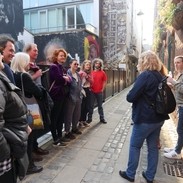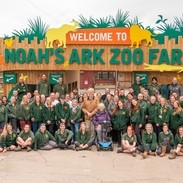Better Business case study: National Forest E-Bike Holidays
VisitBritain/Diensen Pamben

Better Business case study: National Forest E-Bike Holidays
Gentle adventures in the National Forest blend sustainability with distinctive, local experiences and a commitment to supporting the local economy – a winning combination that resonates with customers and has earned national level recognition.

You must accept "Targeting" cookies from in order to watch this video, as YouTube automatically sets cookies of this type.
“I’d seen that there was a growing demand for luxury sustainable tourism, and felt the area was perfect to satisfy that demand”.
Sue Jerham, co-owner
Business benefit: Authentic, local experiences are the new luxury
Inspired by their experience of similar holidays in Germany, owners Sue and Alan Jerham recognised the growing interest in e-bikes in the UK and set up their business to respond to consumer trends, by offering self-guided walking and biking experiences in and around the National Forest in Central England.
Promoting local independents adds appeal
Bespoke local, authentic, and high-quality experiences tap into customer demand, with an emphasis on comfortable, characterful accommodation in small B&Bs, pubs and hotels. Independent local businesses are supported and celebrated. There’s a host of locally-run activities on offer, from forest bathing and kayaking to wood crafts and time in a family-owned spa – with two nights in some locations to maximise the time for these experiences. Sue and Alan also take the time to let guests know of events that they might find interesting or fun, from pub quizzes to music nights. This gives visitors a chance to feel part of the local community during their stay.
Self-guided routes are also tailored to suit the guests’ interests and incorporate suggestions for local businesses, like cafes and restaurants recommended as stopping off points along the way. Itineraries are routed past independent gift and craft shops, with a pick-up service offered for any purchases that guests can’t cycle off with. The company also donates £10 from every booking to support further development and maintenance of the woodland in the National Forest and many of their own suppliers are small businesses, who are paid within two days of invoicing.
Sue and Alan’s sustainability efforts have also gained well-deserved recognition: the business proudly holds a Gold award for Green Tourism and was the Silver Winner for Ethical, Responsible, and Sustainable Tourism in the national Visit England Awards for Excellence 2023.
As well as being fantastic publicity, the process of working towards accreditation and entering awards has provided the business owners with a clear framework to look critically at what they already do and where they can continue to make improvements to how they operate.
Building sustainability into the business, and rooting operations firmly within the local community, has paid dividends for the business. Local people appreciate that the business attracts visitors to the area who respect its special qualities and story of transformation, care about the environment, travel lightly by bike, foot or public transport and spend money locally. Working closely with and supporting other local, independent businesses also means suppliers are always keen to collaborate in creating bespoke experiences for their guests and to provide help and assistance when the company needs it. Combining quality with strong sustainability credentials really has proved a winning formula in responding to customer trends, contributing to the growing success of the business since it was established.
National Forest Company

“I’d seen that there was a growing demand for luxury sustainable tourism, and felt the area was perfect to satisfy that demand”.
Sue Jerham, co-owner
Simple ways to support your local economy
We’re all aware of the importance of guests’ money staying local, but it’s too much to expect of visitors to figure out how to do this and what is really the option that benefits local producers most. However, there are three things you can do to encourage them to behave in ways that will generate the most positive impact for your local economy:
Use local to add character to your offering: One of the most effective ways to encourage a higher local ‘footprint’ is by building it in. For example, a menu that is entirely seasonal and locally sourced can help you stand out among your competitors.
Present local as the ‘not to be missed’: Visitors are motivated by the immediate desire to experience and enjoy, so they’re more likely to choose something presented as irresistible or unmissable – such as the above example of a delicious description of a seasonal local meal.
Make local easy to spot: Your guests might be eager to try the local options, but they might not be able to recognise them when presented with the choice. Using a simple signpost (e.g. a simple logo or sign) that identifies the local option can make a big difference. For example, a morning buffet could use name cards for breakfast items to mark the food and drink items that are locally sourced – making that a factor at the point of guests’ decision.






